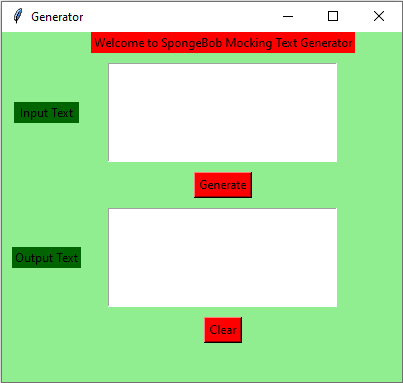Python – 海绵宝宝使用 Tkinter 模拟文本生成器 GUI
先决条件: tkinter 简介 |海绵宝宝模拟文本生成器
Python为开发 GUI(图形用户界面)提供了多种选择。在所有的 GUI 方法中,Tkinter 是最常用的方法。带有 Tkinter 的Python输出创建 GUI 应用程序的最快和最简单的方法。在本文中,我们将学习如何使用 Tkinter 创建海绵宝宝模拟文本生成器 GUI 应用程序,并提供分步指南。
创建一个 Tkinter :
- 导入模块 – tkinter
- 创建主窗口(容器)
- 将任意数量的小部件添加到主窗口。
- 在小部件上应用事件触发器。
GUI 如下所示:

让我们创建一个基于 GUI 的 SpongeBob Mocking Text Generator 应用程序,该应用程序可以根据用户给出的输入生成 SpongeBob 文本。
下面是实现:
Python3
# import all functions from the tkinter
from tkinter import *
# import the random library
import random
# Function to clear both the text areas
def clearAll() :
# whole content of text area is deleted
text1_field.delete(1.0, END)
text2_field.delete(1.0, END)
# Function to Generate SpongeBob Mocking Text
def generate() :
# get a whole input content from text box
# ignoring \n from the text box content
input_text = text1_field.get("1.0", "end")[:-1]
# variable declaration for the output text
output_text = ""
# check the cases for every individual character
for char in input_text:
# check if the character is an alphabet
if char.isalpha():
# convert to upper case
if random.random() > 0.5:
output_text += char.upper()
# convert to lower case
else:
output_text += char.lower()
# if character is not and alphabet
# add it as it is
else:
output_text += char
text2_field.insert('end -1 chars', output_text)
# Driver code
if __name__ == "__main__" :
# Create a GUI window
root = Tk()
# Set the background colour of GUI window
root.configure(background = 'light green')
# Set the configuration of GUI window (WidthxHeight)
root.geometry("400x350")
# set the name of tkinter GUI window
root.title("Generator")
# Create Welcome to SpongeBob Mocking Text Generator label
headlabel = Label(root, text = 'Welcome to SpongeBob Mocking Text Generator',
fg = 'black', bg = "red")
# Create a "Input Text " label
label1 = Label(root, text = " Input Text ",
fg = 'black', bg = 'dark green')
# Create a "Output Text " label
label2 = Label(root, text = "Output Text",
fg = 'black', bg = 'dark green')
# grid method is used for placing
# the widgets at respective positions
# in table like structure .
headlabel.grid(row = 0, column = 1)
# padx keyword argument used to set padding along x-axis .
label1.grid(row = 1, column = 0, padx = 10)
label2.grid(row = 3, column = 0, padx = 10)
# Create a text area box
# for filling or typing the information.
text1_field = Text(root, height = 5, width = 25, font = "lucida 13")
text2_field = Text(root, height = 5, width = 25, font = "lucida 13")
# padx keyword argument used to set padding along x-axis .
# pady keyword argument used to set padding along y-axis .
text1_field.grid(row = 1, column = 1, padx = 10, pady = 10)
text2_field.grid(row = 3, column = 1, padx = 10, pady = 10)
# Create a Generate Button and attached
# with generate function
button1 = Button(root, text = "Generate", bg = "red", fg = "black",
command = generate)
button1.grid(row = 2, column = 1)
# Create a Clear Button and attached
# with clearAll function
button2 = Button(root, text = "Clear", bg = "red",
fg = "black", command = clearAll)
button2.grid(row = 4, column = 1)
# Start the GUI
root.mainloop()输出 :